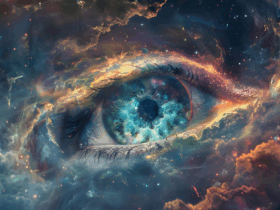Astrology, often regarded as a mystical art, has captivated humanity for centuries with its profound insights into personality, relationships, and destiny. Central to the language of astrology are the planetary symbols, each representing a unique cosmic force with specific meanings and influences on our lives. Let’s delve into the celestial bodies and uncover the rich tapestry of symbolism they weave in the astrological realm.
The Sun (☉): At the heart of our solar system, the Sun reigns supreme in astrology, symbolizing vitality, ego, and self-expression. It represents the core essence of an individual’s identity, their drive for success, and their conscious awareness.
The Moon (☽): Illuminating the night sky, the Moon governs emotions, instincts, and the subconscious mind. Its phases mirror the cyclical nature of life, influencing our moods, intuition, and deepest desires. The Moon symbolizes nurturing, receptivity, and the feminine principle.
Mercury (☿): Named after the fleet-footed messenger of the gods, Mercury embodies communication, intellect, and adaptability. It governs thought processes, rationality, and the exchange of ideas. Mercury’s influence is felt in areas such as writing, learning, and problem-solving.
Venus (♀): Radiating beauty and harmony, Venus symbolizes love, relationships, and aesthetic appreciation. It governs our values, desires, and social interactions, encouraging us to seek pleasure and cultivate meaningful connections. Venus also represents creativity, artistry, and sensuality.
Related: How Astrological Houses Reflect Key Life Areas
Mars (♂): Named after the god of war, Mars embodies energy, passion, and assertiveness. It governs ambition, courage, and the drive to pursue goals with determination. Mars fuels our competitive spirit, propelling us to take action and overcome obstacles in our path.

Jupiter (♃): Known as the “greater benefic,” Jupiter symbolizes expansion, abundance, and wisdom. It governs growth, optimism, and the quest for higher knowledge. Jupiter’s influence inspires optimism, generosity, and a sense of opportunity, encouraging us to broaden our horizons and embrace new experiences.
Saturn (♄): The cosmic taskmaster, Saturn represents structure, discipline, and responsibility. It governs time, limitations, and the principles of order and stability. Saturn’s influence encourages perseverance, self-discipline, and the mastery of life’s challenges, ultimately leading to personal growth and maturity.
Uranus (♅): Breaker of conventions, Uranus symbolizes innovation, originality, and individuality. It governs change, rebellion, and the liberation of the mind from societal norms. Uranus inspires us to embrace our uniqueness, challenge the status quo, and explore unconventional ideas.
Neptune (♆): Shrouded in mystery, Neptune symbolizes spirituality, imagination, and transcendence. It governs dreams, illusions, and the realm of the subconscious. Neptune’s influence fosters compassion, empathy, and the dissolution of boundaries, inviting us to connect with the divine and explore the depths of our psyche.
Related: The Personality Traits of All 12 Zodiac Signs: Strengths and Weaknesses
Pluto (♇): The agent of transformation, Pluto symbolizes power, regeneration, and the cycles of death and rebirth. It governs the process of evolution, upheaval, and the uncovering of hidden truths. Pluto’s influence compels us to confront our deepest fears, release what no longer serves us, and embrace profound personal transformation.
In astrology, the interplay of these planetary symbols within the birth chart offers profound insights into an individual’s personality, strengths, challenges, and life path. By understanding the language of astrology through the celestial bodies, we can navigate the cosmic dance of life with greater clarity, purpose, and alignment with the universe’s guiding forces.





















